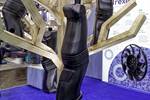Trexel Announces New CEO
Levi Kishbaugh, who has been at Trexel since 1999 and most recently served as VP of Engineering at the company, replaces fomer CEO Brian Bechard who passed away suddenly last August.
Trexel Inc. (Wilmington, Mass.) promoted Levi Kishbaugh to the position of CEO. At Trexel since 1999, Kishbaugh started as the Director of Process Development for injection molding technology and most recently served as VP Engineering. Kishbaugh replaces Brian Bechard who passed away suddenly of a heart attack on August 6, 2022. Bechard had served as Trexel CEO since 2015.
During Kishbaugh’s management of design and development activities, Trexel launched a new family of super critical fluid (SCF) system designs, including one for fast-cycle packaging applications; a system to serve the footwear industry that adjusts the SCF dose on a shot-to-shot basis; and an optimized system for extrusion and accumulator blow molding.
Kishbaugh’s areas of expertise include the MuCell process; injection molding; and materials and application development. Prior to Trexel, Kishbaugh worked in product and application development roles at Montell Polyolefins and The Dow Chemical Company. He received his bachelor’s degree in science from Stevens Institute of Technology.

Levi Kishbaugh, who has been with the company since 1999, was named the new CEO of Trexel.
Photo Credit: Trexel
Related Content
-
NPE2024 Wrap-Up: Sustainability Dominates Show Floor News
Across all process types, sustainability was a big theme at NPE2024. But there was plenty to see in automation and artificial intelligence as well.
-
Get Color Changes Right In Extrusion Blow Molding
Follow these best practices to minimize loss of time, material and labor during color changes in molding containers from bottles to jerrycans. The authors explore what this means for each step of the process, from raw-material infeed to handling and reprocessing tails and trim.
-
Coca-Cola’s Redesign of Small PET Bottles Pushes Lightweighting Below Prior ‘Floor’
Coca-Cola thought it had reached the limits of lightweighting for its small PET carbonated soft drink bottles. But a “complete redesign” led to a further 12% reduction.












